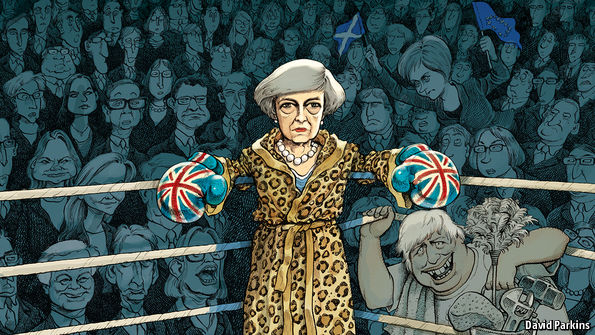And that is bad for America—and the world
DONALD TRUMP won the White House on the promise that government is easy. Unlike his Democratic opponent, whose career had been devoted to politics, Mr Trump stood as a businessman who could Get Things Done. Enough voters decided that boasting, mocking, lying and grabbing women were secondary. Some Trump fans even saw them as the credentials of an authentic, swamp-draining saviour.
After 70 days in office, however, Mr Trump is stuck in the sand. A health-care bill promised as one of his “first acts” suffered a humiliating collapse in the—Republican-controlled—Congress (see Lexington). His repeated attempts to draft curbs on travel to America from some Muslim countries are being blocked by the courts. And suspicions that his campaign collaborated with Russia have cost him his national security adviser and look likely to dog his administration (see article). Voters are not impressed. No other president so early in his first term has suffered such low approval ratings.
It is tempting to feel relief that the Trump presidency is a mess. For those who doubt much of his agenda and worry about his lack of respect for institutions, perhaps the best hope is that he accomplishes little. That logic is beguiling, but wrong. After years of gridlock, Washington has work to do. The forthcoming summit with Xi Jinping, China’s president, shows how America is still the indispensable nation. A weak president can be dangerous—picture a trade war, a crisis in the Baltics or conflict on the Korean peninsula.
The nature of political power is different, too. As owner and CEO of his business, Mr Trump had absolute control. The constitution sets out to block would-be autocrats. Where Mr Trump has acted appropriately—as with his nomination of a principled, conservative jurist to fill a Supreme Court vacancy—he deserves to prevail. But when the courts question the legality of his travel order they are only doing their job. Likewise, the Republican failure to muster a majority over health-care reflects not just divisions between the party’s moderates and hardliners, but also the defects of a bill that, by the end, would have led to worse protection, or none, for tens of millions of Americans without saving taxpayers much money.
Far from taking Washington by storm, America’s CEO is out of his depth. The art of political compromise is new to him. He blurs his own interests and the interests of the nation. The scrutiny of office grates. He chafes under the limitations of being the most powerful man in the world. You have only to follow his incontinent stream of tweets to grasp Mr Trump’s paranoia and vanity: the press lies about him; the election result fraudulently omitted millions of votes for him; the intelligence services are disloyal; his predecessor tapped his phones. It’s neither pretty nor presidential.
That the main victim of these slurs has so far been the tweeter-in-chief himself is testament to the strength of American democracy. But institutions can erode, and the country is wretchedly divided (see article). Unless Mr Trump changes course, the harm risks spreading. The next test will be the budget. If the Republican Party cannot pass a stop-gap measure, the government will start to shut down on April 29th. Recent jitters in the markets are a sign that investors are counting on Mr Trump and his party to pass legislation.
More than anything, they are looking for tax reform and an infrastructure plan. There is vast scope to make fiscal policy more efficient and fairer (see article). American firms face high tax rates and have a disincentive to repatriate profits. Personal taxes are a labyrinth of privileges and loopholes, most of which benefit the well-off. Likewise, the country’s cramped airports and potholed highways are a drain on productivity. Sure enough, Mr Trump has let it be known that he now wants to tackle tax. And, in a bid to win support from Democrats, he may deal with infrastructure at the same time.
Yet the politics of tax reform are as treacherous as the politics of health care, and not only because they will generate ferocious lobbying. Most Republican plans are shockingly regressive, despite Mr Trump’s blue-collar base. To win even a modest reform, Mr Trump and his team will have to show a mastery of detail and coalition-building that has so far eluded them. If Mr Trump’s popularity falls further, the job of winning over fractious Republicans will only become harder.
Were he frustrated in Congress, the president would surely fall back on areas where he has a free hand. He has already made full-throated use of executive orders and promises to harness the bureaucracy to force through his agenda. In theory he could deregulate parts of the economy, such as finance, where the hand of government is sometimes too heavy. Yet his executive orders so far have been crudely theatrical—as with this week’s repeal of Barack Obama’s environmental rules, which will not lead to the renaissance of mining jobs that he has disingenuously promised coal country (see article). It is the same with trade. Mr Trump could work through the World Trade Organisation to open markets. More probably, the economic nationalists on his team will have the upper hand. If so, America will take a bilateral approach, trade protection will grow and foreign policy will become more confrontational.
After 70 days in office, however, Mr Trump is stuck in the sand. A health-care bill promised as one of his “first acts” suffered a humiliating collapse in the—Republican-controlled—Congress (see Lexington). His repeated attempts to draft curbs on travel to America from some Muslim countries are being blocked by the courts. And suspicions that his campaign collaborated with Russia have cost him his national security adviser and look likely to dog his administration (see article). Voters are not impressed. No other president so early in his first term has suffered such low approval ratings.
Latest updates
The business of government
Mr Trump is hardly the first tycoon to discover that business and politics work by different rules. If you fall out over a property deal, you can always find another sucker. In politics you cannot walk away so easily. Even if Mr Trump now despises the Republican factions that dared defy him over health care, Congress is the only place he can go to pass legislation.The nature of political power is different, too. As owner and CEO of his business, Mr Trump had absolute control. The constitution sets out to block would-be autocrats. Where Mr Trump has acted appropriately—as with his nomination of a principled, conservative jurist to fill a Supreme Court vacancy—he deserves to prevail. But when the courts question the legality of his travel order they are only doing their job. Likewise, the Republican failure to muster a majority over health-care reflects not just divisions between the party’s moderates and hardliners, but also the defects of a bill that, by the end, would have led to worse protection, or none, for tens of millions of Americans without saving taxpayers much money.
Far from taking Washington by storm, America’s CEO is out of his depth. The art of political compromise is new to him. He blurs his own interests and the interests of the nation. The scrutiny of office grates. He chafes under the limitations of being the most powerful man in the world. You have only to follow his incontinent stream of tweets to grasp Mr Trump’s paranoia and vanity: the press lies about him; the election result fraudulently omitted millions of votes for him; the intelligence services are disloyal; his predecessor tapped his phones. It’s neither pretty nor presidential.
That the main victim of these slurs has so far been the tweeter-in-chief himself is testament to the strength of American democracy. But institutions can erode, and the country is wretchedly divided (see article). Unless Mr Trump changes course, the harm risks spreading. The next test will be the budget. If the Republican Party cannot pass a stop-gap measure, the government will start to shut down on April 29th. Recent jitters in the markets are a sign that investors are counting on Mr Trump and his party to pass legislation.
More than anything, they are looking for tax reform and an infrastructure plan. There is vast scope to make fiscal policy more efficient and fairer (see article). American firms face high tax rates and have a disincentive to repatriate profits. Personal taxes are a labyrinth of privileges and loopholes, most of which benefit the well-off. Likewise, the country’s cramped airports and potholed highways are a drain on productivity. Sure enough, Mr Trump has let it be known that he now wants to tackle tax. And, in a bid to win support from Democrats, he may deal with infrastructure at the same time.
Yet the politics of tax reform are as treacherous as the politics of health care, and not only because they will generate ferocious lobbying. Most Republican plans are shockingly regressive, despite Mr Trump’s blue-collar base. To win even a modest reform, Mr Trump and his team will have to show a mastery of detail and coalition-building that has so far eluded them. If Mr Trump’s popularity falls further, the job of winning over fractious Republicans will only become harder.
Were he frustrated in Congress, the president would surely fall back on areas where he has a free hand. He has already made full-throated use of executive orders and promises to harness the bureaucracy to force through his agenda. In theory he could deregulate parts of the economy, such as finance, where the hand of government is sometimes too heavy. Yet his executive orders so far have been crudely theatrical—as with this week’s repeal of Barack Obama’s environmental rules, which will not lead to the renaissance of mining jobs that he has disingenuously promised coal country (see article). It is the same with trade. Mr Trump could work through the World Trade Organisation to open markets. More probably, the economic nationalists on his team will have the upper hand. If so, America will take a bilateral approach, trade protection will grow and foreign policy will become more confrontational.
The character question
The Americans who voted for Mr Trump either overlooked his bombast, or they saw in him a tycoon with the self-belief to transform Washington. Although this presidency is still young, that already seems an error of judgment. His policies, from health-care reform to immigration, have been poor—they do not even pass the narrow test that they benefit Trump voters. Most worrying for America and the world is how fast the businessman in the Oval Office is proving unfit for the job.


